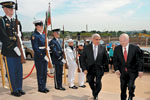 |
Bulgarian soldiers stand ready during International Security and Assistance Force (ISAF) operations in Afghanistan. Bulgaria is looking at an entirely new force modernization effort so it can maintain an effective military and continue to meet its international obligations. |
History and current events task planners with no easy choices.
Barely six years after it joined NATO, Bulgaria is in the throes of a major military upheaval as it strives to modernize its forces effectively amid severe budget constraints. The Black Sea nation must undo decades of stagnation as a Warsaw Pact member along with more recent missteps during its early modernization efforts.
Short-term remedies may include restructuring or abrogating ongoing large procurement programs. For the long term, the country is looking at building an entirely new military based on plans not yet developed. And, all these changes must take place against the backdrop of tight budgets brought about by the global financial downturn.
Bulgaria’s minister of defense, Anyu Angelov, asserts that the country’s past defense management had many shortcomings. Many of Bulgaria’s modernization efforts were not aligned with available financial or material resources, he declares. A large number of those efforts had to be abandoned, and Bulgaria needed to adopt a new approach to military modernization.
Accordingly, nine months ago the country launched a major force structure review that will dominate future defense planning. This review features an in-depth analysis of the security environment and of the tasks facing the Bulgarian Armed Forces both on the national level and in coalition operations, and a thorough examination of the defense resources. The result will be the definition of what type of defense the country needs—and what defense capabilities it can afford, Angelov explains.
This review in turn will generate a white paper that will be submitted for public discussion and ultimately for adoption by the civilian government. Angelov adds that this document will provide the midterm vision for force development.
“What we are trying to achieve is to build a single set of forces to respond to all tasks, with a single command system for both peacetime and crisis management,” he says. The modernization would cover task organization, equipment and combat training, which would be adequately provided with the necessary financial resources and materiel.
Bulgaria aims to establish modern defense management to ensure effectiveness as well as “the absolute legitimacy of defense decisions, along with responsible and transparent defense spending,” Angelov says. Preventing corruption also would be a cornerstone of this effort.
Angelov describes the country’s previous force modernization efforts as little more than just plans for purchasing equipment, particularly new platforms. The new thrust instead will be around capabilities staffed by well-trained personnel. Again, this is a focal point of the force structure review, which is centered around capability-based planning. A preliminary analysis is drawing a picture of which capabilities Bulgaria should discard and which capabilities it lacks—and therefore must build up.
On the personnel front, Bulgaria seeks to transition its all-volunteer force into a more professional military. This will place increased emphasis on training and education, and that area also will require modernization. The country already has begun some force reductions in both civilian and military personnel, although the military cuts should not be severe.
Looking at broad military needs, Angelov cites several areas in need of modernization. For the midterm, air defense is high on the list. He notes that Bulgaria’s military faces “a deficit of capabilities” in this arena, adding that the country’s collection of MiG-29s and MiG-21s are aging and will need to be replaced—possibly by as soon as late 2012. Accordingly, the country will need to acquire a multirole fighter aircraft. Acquisition for this new fighter likely will begin in 2011, as Bulgaria already has begun talks with foreign contractors.
Land forces also need modernization, and Bulgaria is working to be included in the U.S. assistance program for countries that participate in International Security Assistance Force (ISAF) operations in Afghanistan. Bulgaria is a longtime participant in ISAF, and it is looking to build on that expertise as it modernizes its land forces. From this program, Bulgaria hopes to build new capabilities for its expeditionary forces, which will help it meet NATO and other mission obligations.
One modernization success has occurred in air defense, Angelov offers. Several modernization projects have helped shape Bulgarian air defense to suit the country’s obligations in NATO. These efforts have included new frequencies and other measures to suit a battlefield environment.
Communications and information systems also are a top priority. Angelov relates that some modernization has taken place, but only in a single battalion. He characterizes this modernization as another success story, as that battalion now has an integrated communications system. However, the country’s overall command, control, communications, computers and intelligence (C4I) systems need continued modernization. This applies to the armed forces as a whole, Angelov says.
The country’s military needs a full range of new C4I systems. For its land forces, Bulgaria wants to have mobile communications and information systems up to the brigade level, Angelov allows. It also must upgrade its fixed-station capabilities.
 |
Bulgarian Minister of Defense Anyu Angelov (c) talks with U.S. Secretary of Defense Robert Gates (r) as they walk up the Pentagon steps during the minister’s visit in June 2010. |
A major drawback is the lack of effective intelligence, surveillance and reconnaissance systems. In particular,
Bulgaria needs to acquire network-enabled capabilities with a focus on intelligence, surveillance, target acquisition and reconnaissance, or ISTAR. A related requirement is for thermal- and night-vision goggles and systems.
Angelov notes that Bulgaria has purchased helicopters, but they are not effective in hostile environments. The country’s helicopter force must be upgraded to serve in a broader range of environments. Land vehicles also need better mobility as well as improved protective armor, he adds.
Most modern militaries are striving to upgrade soldier equipment, and Bulgaria is no exception. Angelov cites a new generation of protective clothing, personal weapons systems, electro-optical vision gear and identification friend-or-foe (IFF) equipment. These advances are crucial both for land forces and for the air force, he says.
And, Bulgaria’s experiences with the ISAF in Afghanistan have driven home the importance of countering improvised explosive devices (IEDs). Angelov states that Bulgaria needs systems that can detect and counter IEDs.
Another capability needed by Bulgaria’s military is unmanned vehicles. Angelov cites both air and ground unmanned vehicles as part of future Bulgarian battlefield forces.
As with all NATO nations, Bulgaria must deal with cyberwar. With the country improving its military networks, the need for protection from cyberwar is increasing, and Bulgaria needs new capabilities to face this threat, Angelov states.
However, many of these necessities have run afoul of fiscal constraints. These include past programs that were designed to fill requirements but either are falling short or are too expensive for the country to afford. The result may be a new approach to tapping indigenous industry to meet Bulgaria’s military needs.
The relationship between Bulgaria’s military and its defense industry is important, Angelov says. Industry contributes to national security, and it is expected to propose reliable solutions capable of meeting the military’s requirements.
Bulgaria’s defense industry soon may have an international flavor. Angelov expresses the hope that leading European and U.S. companies will engage in cooperative technological and industrial efforts with their Bulgarian counterparts. This would enable the Bulgarian firms to manufacture the necessary high-technology products the military needs, he says.
In particular, Angelov says, Bulgaria would like to integrate its defense industry into the European defense technological and industrial base. He cites the European Union’s (E.U.’s) joint efforts to build a consolidated European defense equipment market. “Bulgaria supports all efforts aimed at establishing a level playing field for European defense industries,” Angelov declares, adding that it is a major cornerstone in the E.U. endeavor.
To achieve all of these goals, Angelov is calling for consolidation within Bulgaria’s defense industry. The way to achieve that is not clear, he adds. He notes that previous Bulgarian defense industrial privatization efforts were rife with mistakes, whereas Poland’s efforts succeeded when several entities were consolidated into a single unit. However, that may not be as easily applied to Bulgaria now, he says.
Angelov is not shy about citing Bulgaria’s past problems with corruption among leaders in government and the defense industry. The ministry is dedicated to preventing a return to those conditions, he emphasizes. Many past contracts are under investigation for possible prosecution.
“The present leadership of the Ministry of Defense pursues a stern policy of anti-corruption and strict observation of the public procurement law with regard to the acquisition of goods and services,” he declares. “This guarantees the following of the principles of competition, equal access and equal treatment of companies and nondiscrimination—regardless of whether those companies are Bulgarian or foreign ones.”
The global financial crisis that has forced many countries to reorganize government spending priorities has not spared Bulgaria. Angelov offers that the country should reconsider some program contracts, and it may look at restructuring some payments. Several of the contracts that might be restructured or reduced are those with Eurocopter for new transport helicopters; with Daimler for new land vehicles; and with Alenia Aeronautica for new transport aircraft. Angelov relates that company representatives for each program have been invited to renegotiate contract terms.
Because of severe financial constraints, Bulgaria might not be able to engage in major new acquisitions until 2015. For many years, Bulgaria spent at least 2 percent of its gross domestic product on defense. But the ministry’s goal now is to maintain a defense spending budget representing at least 1.4 percent of Bulgaria’s gross domestic product to be able to modernize its military.
Currently, 80 percent of Bulgaria’s military budget is spent on personnel, Angelov reports. Bulgaria wants to lower that to 65 percent and to be able to spend 15 percent on capital investment.
If Bulgaria is able to devote the necessary financial resources to the plans that emerge from the strategic review, then it will have a much more effective armed force for both peacetime and wartime, Angelov states. “We can achieve that with very hard work from all elements of defense management,” he says. This will require an efficient and effective command structure.
“The Bulgarian Armed Forces should become a truly joint military force with modern organization, enabling flexible solutions and participation in a variety of types of operations, equipped with effective military platforms and systems, and, doctrinally, organizationally and technologically interoperable according to NATO standards,” Angelov declares.
“I can’t say right now that we have armed forces that are fully capable of fulfilling all their tasks,” he attests. “We are trying now to escape from wishful thinking; and the armed forces today are able to fulfill the tasks that are in front of them. But, also, there are many uncertainties that need real, affordable modernization—and we will do that, but it will take time.”
WEB RESOURCE
Bulgaria Ministry of Defense (English): www.md.government.bg/en/index.html






Comments